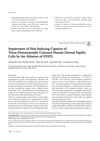 1 citations,
September 2020 in “Cochrane library (CD-ROM)”
1 citations,
September 2020 in “Cochrane library (CD-ROM)” The analysis aims to identify the most effective and safest treatments for alopecia areata.
 1 citations,
January 2019 in “Przegla̧d dermatologiczny”
1 citations,
January 2019 in “Przegla̧d dermatologiczny” Skin problems like psoriasis and systemic sclerosis can increase the risk of heart disease, so doctors should watch for heart risks in patients with these conditions.
 1 citations,
January 2019 in “Annals of dermatology/Annals of Dermatology”
1 citations,
January 2019 in “Annals of dermatology/Annals of Dermatology” STAT5 is crucial for hair growth in 3D cultured human dermal papilla cells.
 1 citations,
August 2018 in “bioRxiv (Cold Spring Harbor Laboratory)”
1 citations,
August 2018 in “bioRxiv (Cold Spring Harbor Laboratory)” A new mutation in the TMEM173 gene and a risk allele in IFIH1 cause a unique set of immune-related symptoms.
 1 citations,
March 2018 in “Dermatologie pro praxi”
1 citations,
March 2018 in “Dermatologie pro praxi” Most over-the-counter hair loss treatments lack strong evidence of effectiveness, except for minoxidil, which works but stops working if you stop using it.
 1 citations,
January 2021 in “Skin appendage disorders”
1 citations,
January 2021 in “Skin appendage disorders” A woman with alopecia regrew her hair after taking a higher dose of tocilizumab.
 July 2024 in “Journal of Dermatology Research Reviews & Reports”
July 2024 in “Journal of Dermatology Research Reviews & Reports” Stem cell therapy shows promise for treating hair loss by promoting hair growth.
 June 2024 in “Dermatology and Therapy”
June 2024 in “Dermatology and Therapy” Baricitinib improves quality of life and reduces anxiety and depression in severe alopecia areata patients with hair regrowth.
 December 2023 in “bioRxiv (Cold Spring Harbor Laboratory)”
December 2023 in “bioRxiv (Cold Spring Harbor Laboratory)” AP-2α and AP-2β proteins are essential for healthy adult skin and hair.
 October 2023 in “Frontiers in medicine”
October 2023 in “Frontiers in medicine” Targeted immunotherapy could be a promising new treatment for hair regrowth.
 September 2023 in “International Journal of Applied Pharmaceutics”
September 2023 in “International Journal of Applied Pharmaceutics” The formulated gel is a promising treatment for alopecia areata.
 August 2023 in “Clinical and experimental dermatology and therapies”
August 2023 in “Clinical and experimental dermatology and therapies” Dupilumab may help hair regrowth in some patients with severe atopic dermatitis, but results vary.
 July 2023 in “The Egyptian Journal of Hospital Medicine ”
July 2023 in “The Egyptian Journal of Hospital Medicine ” The conclusion is that emotional support and a variety of treatments are important for alopecia areata, but more research is needed.
 June 2023 in “Dermatology and therapy”
June 2023 in “Dermatology and therapy” The Middle East and Africa need better data, treatment consensus, and support for Alopecia Areata.
 April 2023 in “Medizinische Genetik”
April 2023 in “Medizinische Genetik” New research has found 14 genes linked to the risk of developing alopecia areata, improving understanding and treatment options.
 January 2022 in “International journal of zoology and animal biology”
January 2022 in “International journal of zoology and animal biology” Dogs with dermatomyositis, especially Collies and Shetland Sheepdogs, need better treatments for their skin and muscle inflammation.
 September 2021 in “Farmacja Polska”
September 2021 in “Farmacja Polska” Scalp needle mesotherapy can effectively treat hair loss and improve hair growth.
 June 2020 in “Journal of Dermatological Treatment”
June 2020 in “Journal of Dermatological Treatment” Use telemedicine and strict hygiene for safe hair and scalp treatments during COVID-19.
 November 2019 in “Harper's Textbook of Pediatric Dermatology”
November 2019 in “Harper's Textbook of Pediatric Dermatology” The document is a detailed medical reference on skin and genetic disorders.

Changes in skin bacteria can affect hair loss and new treatments targeting these bacteria may prevent balding without sexual side effects.
 April 2018 in “bioRxiv (Cold Spring Harbor Laboratory)”
April 2018 in “bioRxiv (Cold Spring Harbor Laboratory)” Certain small molecules can help regrow hair by turning on the body's cell cleanup process.
 January 2018 in “Elsevier eBooks”
January 2018 in “Elsevier eBooks” The document concludes that alopecia has significant social and psychological effects, leading to a market for hair loss treatments.
 December 2024 in “Frontiers in Veterinary Science”
December 2024 in “Frontiers in Veterinary Science” Dorper sheep's wool shedding is linked to specific genes and pathways, which may help understand human hair growth.
 February 2024 in “Frontiers in physiology”
February 2024 in “Frontiers in physiology” Hair follicle stem cells help skin heal and grow during stretching.
 September 2023 in “Frontiers in cell and developmental biology”
September 2023 in “Frontiers in cell and developmental biology” Vav2 changes how hair follicle stem cells' genes work as they age, which might improve regeneration but also raise cancer risk.
 September 2023 in “Frontiers in bioengineering and biotechnology”
September 2023 in “Frontiers in bioengineering and biotechnology” JAGGED1 could help regenerate tissues for bone loss and heart damage if delivered correctly.

Screening for iron levels in patients with hair loss may help find a genetic iron overload condition early.
 January 2019 in “Georg Thieme Verlag eBooks”
January 2019 in “Georg Thieme Verlag eBooks” Platelet-Rich Plasma (PRP) therapy can effectively treat various hair loss conditions, improve hair count, thickness, and density, and potentially speed up results when combined with surgical techniques.
 July 2018 in “British Journal of Dermatology”
July 2018 in “British Journal of Dermatology” Hair regrowth was seen in 83% of children with alopecia, immune system plays a role in the condition, and various treatments showed effectiveness for hair and nail disorders.
 November 2020 in “Postepy Dermatologii I Alergologii”
November 2020 in “Postepy Dermatologii I Alergologii” Sulfotransferase SULT1A1 activity may predict minoxidil treatment success for hair loss.






























